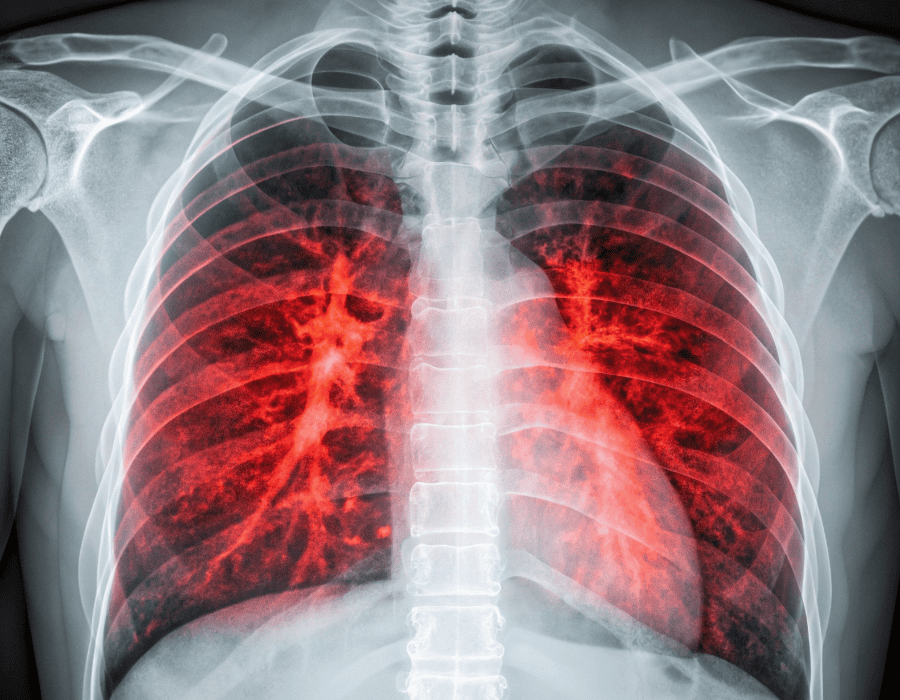That heavy, tight feeling in your chest — the one that makes every breath a little harder — is what most people call chest congestion. It’s usually caused by mucus buildup in your airways, and while it’s often a result of a simple cold or flu, sometimes it can signal something more serious.
In this guide, we’ll unpack what chest congestion really is, what causes it, how to relieve it at home, and when to seek medical care — especially if you’re traveling and need to find help fast.
What Is Chest Congestion?

Chest congestion happens when mucus builds up in your lower airways or lungs, making it harder for air to move in and out freely. This can cause coughing, wheezing, tightness, or even a “crackling” sound when you breathe.
According to the Cleveland Clinic, congestion isn’t a condition itself — it’s a symptom of something else, like an infection or inflammation in your respiratory system. The body produces mucus to trap germs and irritants, but too much of it can clog your airways and make breathing uncomfortable.
What Causes Chest Congestion?
As Medical News Today explains, mucus production is the body’s way of trapping bacteria or irritants; however, too much production can lead to blockages and coughing.
1. Viral Infections
Colds, flu, and viral bronchitis are the most common culprits. These infections irritate your airways, triggering mucus production as your body tries to flush the virus out.
2. Bacterial Infections
Bacterial bronchitis or pneumonia can cause thicker, discolored mucus, along with fever and fatigue. In these cases, antibiotics prescribed by a doctor may be necessary.
3. Chronic Respiratory Conditions
People with asthma, COPD (chronic obstructive pulmonary disease), or cystic fibrosis often experience ongoing chest congestion. These conditions make it harder for the lungs to clear mucus naturally.
4. Allergies or Irritants
Exposure to smoke, pollution, or dust can inflame your airways and lead to congestion — even if you’re not sick.
5. Acid Reflux (GERD)
Sometimes mucus builds up because stomach acid irritates the throat and airways, a less obvious but common cause of chronic congestion.
In short: colds and infections causeacute congestion, while allergies, asthma, or reflux can cause chronic congestion that lingers for weeks or months.
Signs & Symptoms of Chest Congestion

You’ll often feel it before you hear it — that tight, heavy sensation deep in your chest.
Common symptoms include:
- Productive (wet) cough
- Wheezing or crackling when breathing
- Chest tightness or pressure
- Fatigue
- Mild fever or chills
Alarming symptoms to watch for:
- Shortness of breath
- Coughing up blood
- Chest pain
- High fever
- Mucus that’s thick, green, or foul-smelling
If you experience any of these, it’s important to see a doctor — especially if symptoms last more than 10 days or worsen instead of improving.
How to Get Rid of Chest Congestion: Home Remedies & Over-the-Counter Medicine
Simple home remedies such as steam inhalation, warm liquids, and using a humidifier can help loosen mucus and relieve congestion, according to Harvard Health Publishing. Let’s look at some ways you can get rid of chest congestion at home.
Stay Hydrated
Drinking plenty of water helps thin the mucus so it’s easier to cough up. Warm fluids like tea or broth can also soothe irritation.
Use Steam and Humidity
Inhaling warm, moist air from a hot shower or humidifier can loosen mucus. You can even try a bowl of hot water and a towel “steam tent” for quick relief.
Rest and Elevate
Sleeping slightly upright can prevent mucus from pooling in your chest overnight.
Try Over-the-Counter (OTC) Chest Congestion Medicine
The most common OTC options include:
- Expectorants (like guaifenesin) — loosen mucus so you can cough it out.
- Decongestants — shrink swollen airways and reduce mucus buildup.
- Saline sprays — help clear nasal passages that contribute to congestion.
Note: These medications ease symptoms but don’t cure the underlying cause. Always follow the label instructions or ask a healthcare professional before using them.
When to See a Doctor
While mild chest congestion usually clears up within a week or two, there are times when you shouldn’t wait it out.
You should see a doctor if:
- You have chest pain or shortness of breath
- You’re coughing up blood
- You have a fever that lasts longer than three days
- The congestion doesn’t improve after 10–14 days
- You have a chronic condition like asthma or COPD
According to the Centers for Disease Control and Prevention (CDC), you should see a doctor if your cough lasts more than three weeks, produces blood, or comes with fever, wheezing, or shortness of breath.
Managing Chest Congestion with Chronic Conditions

The Mayo Clinic notes that people with chronic bronchitis, COPD, or asthma are more prone to mucus buildup — especially when exposed to air pollution or cigarette smoke.
If you have asthma, COPD, or another long-term respiratory issue, managing chest congestion means staying ahead of flare-ups.
- Keep your prescribed inhaler or nebulizer with you when traveling.
- Avoid smoky or dusty environments that can trigger inflammation.
- Monitor your mucus — changes in color or texture can indicate infection.
- Get regular check-ups to keep your treatment plan updated.
Final Thoughts
Chest congestion might be a common symptom, but that doesn’t mean it’s always harmless. Understanding the cause helps you treat it effectively — whether it’s from a cold, allergies, or a chronic condition.
So stay hydrated, rest up, and know when to call a doctor. And if you’re away from home, Air Doctor connects you with trusted local physicians in just a few taps — anywhere in the world.
About Air Doctor
With the Air Doctor app in your pocket, you can access trusted medical care and receive expert guidance whenever and wherever you need it — at home or while traveling.
Air Doctor offers a wide range of benefits, including:
- A global network of over 20,000 multi-lingual doctors and specialists
- Choice of clinic, at-home (hotel), and video consultations
- Healthcare access in 90+ countries
- 24/7 multi-lingual support
- Transparent pricing and patient reviews
- Access to most common medical specialties — including pulmonologists, general practitioners, and internal medicine specialists
Whether you’re dealing with chest congestion, a lingering cough, or need advice on antibiotics while abroad, Air Doctor makes it easy to find and book a trusted doctor in minutes.
FAQs
Stay hydrated, use steam or humidifiers, and try gentle chest percussion to help move mucus up and out.
Drinking water, using an expectorant like guaifenesin, and practicing deep breathing can help flush mucus from your lungs naturally.
If it lasts more than a couple of weeks, it could be due to asthma, allergies, or infection — you may need a doctor to identify the cause.
Sources
- Cleveland Clinic. Chest Congestion: Causes, Symptoms & Treatment.
https://my.clevelandclinic.org/health/symptoms/chest-congestion - Medical News Today. Chest Congestion: What It Means and How to Relieve It.
https://www.medicalnewstoday.com/articles/chest-congestion - Centers for Disease Control and Prevention (CDC). About Acute Bronchitis.
https://www.cdc.gov/acute-bronchitis/about/index.html - Mayo Clinic. Chronic Bronchitis: Symptoms & Causes.
https://www.mayoclinic.org/diseases-conditions/chronic-bronchitis/symptoms-causes/syc-2035158 - Harvard Health Publishing. Cold, Cough, and Congestion Relief.
https://www.health.harvard.edu/












